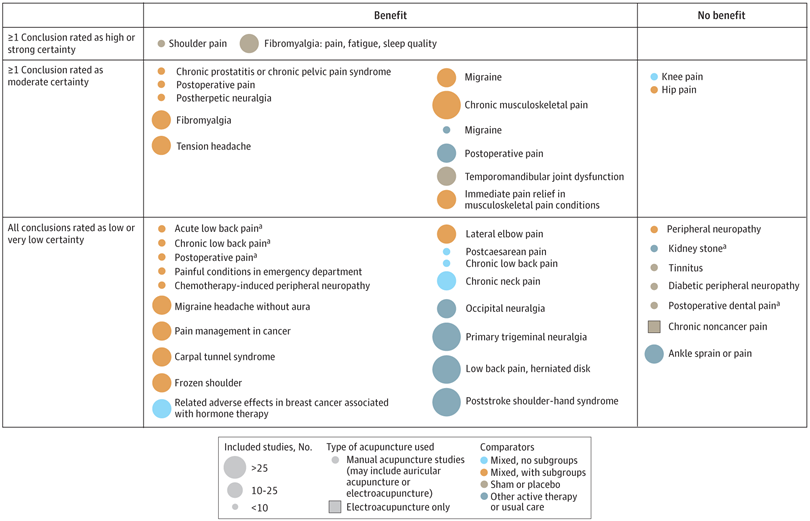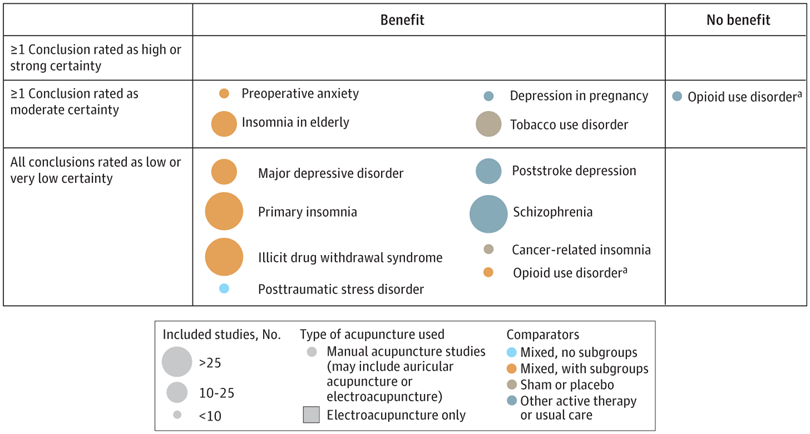Is acupuncture more than a theatrical placebo? Acupuncture fans are convinced that the answer to this question is YES. Perhaps this paper will make them think again.
A new analysis mapped the systematic reviews, conclusions, and certainty or quality of evidence for outcomes of acupuncture as a treatment for adult health conditions. Computerized search of PubMed and 4 other databases from 2013 to 2021. Systematic reviews of acupuncture (whole body, auricular, or electroacupuncture) for adult health conditions that formally rated the certainty, quality, or strength of evidence for conclusions. Studies of acupressure, fire acupuncture, laser acupuncture, or traditional Chinese medicine without mention of acupuncture were excluded. Health condition, number of included studies, type of acupuncture, type of comparison group, conclusions, and certainty or quality of evidence. Reviews with at least 1 conclusion rated as high-certainty evidence, reviews with at least 1 conclusion rated as moderate-certainty evidence and reviews with all conclusions rated as low- or very low-certainty evidence; full list of all conclusions and certainty of evidence.
A total of 434 systematic reviews of acupuncture for adult health conditions were found; of these, 127 reviews used a formal method to rate the certainty or quality of evidence of their conclusions, and 82 reviews were mapped, covering 56 health conditions. Across these, there were 4 conclusions that were rated as high-certainty evidence and 31 conclusions that were rated as moderate-certainty evidence. All remaining conclusions (>60) were rated as low- or very low-certainty evidence. Approximately 10% of conclusions rated as high or moderate-certainty were that acupuncture was no better than the comparator treatment, and approximately 75% of high- or moderate-certainty evidence conclusions were about acupuncture compared with a sham or no treatment.
Three evidence maps (pain, mental conditions, and other conditions) are shown below
The authors concluded that despite a vast number of randomized trials, systematic reviews of acupuncture for adult health conditions have rated only a minority of conclusions as high- or moderate-certainty evidence, and most of these were about comparisons with sham treatment or had conclusions of no benefit of acupuncture. Conclusions with moderate or high-certainty evidence that acupuncture is superior to other active therapies were rare.
These findings are sobering for those who had hoped that acupuncture might be effective for a range of conditions. Despite the fact that, during recent years, there have been numerous systematic reviews, the evidence remains negative or flimsy. As 34 reviews originate from China, and as we know about the notorious unreliability of Chinese acupuncture research, this overall result is probably even more negative than the authors make it out to be.
Considering such findings, some people (including the authors of this analysis) feel that we now need more and better acupuncture trials. Yet I wonder whether this is the right approach. Would it not be better to call it a day, concede that acupuncture generates no or only relatively minor effects, and focus our efforts on more promising subjects?




Hi Edzard,
Is there any hint about a risk/benefit ratio? My concern is the risk of infection caused by unsterile needles- in the past.
One can find some papers from the 80ies where infections caused by acupunture. I am not able to read Chinese or Indian papers- may be there are some hints.
But acupuncture was performed, when one has no idea of viruses or other pathogens. In early days acupuncture was performed in India and China- and these two countries had a very high prevalence of chronic Hepatitis B carriers- may be transmitted by chronic Hep B mothers during delivery.
About 1983 I remember that in the Österreichische Ärztezeitung there were advertisments claiming “autosterile needels”
– these were very expensive, but consited of gold. Horrible.
mild to moderate side effects of acupuncture occur in about 10% of all patients. Much more serious complications of acupuncture are on record as well: acupuncture needles can, for instance, injure vital organs like the lungs or the heart, and they can introduce infections into the body, e.g. hepatitis. About 100 fatalities after acupuncture have been reported in the medical literature—a figure which, due to the lack of a monitoring system, may disclose just the tip of the iceberg.
the risk/benefit balance depends also on the benefit which obviously depends on the indication.
One of the most common serious adverse events after acupuncture is pneumothorax. In my country a young pregnant woman suffered bilateral pneumothorax some years ago. She was being “treated” for nausea of early pregnancy. This can be an immediately life-threatening condition. Several deaths from pneumothorax have occurred in Denmark in a few years, the latest being a gentleman with bladder-cancer who in desperation sought the help of an “alternative practitioner” who stuck him with ten needles. He immediately got short of breath on the table and died before getting proper medical attention.
Many practitioners think it is safe to stick away from the lungs. This is far from the truth. In 2017 a man in Norway succumbed to overwhelming sepsis after acupuncture in the hand. This was allegedly performed in a teaching institution for acupuncture!
The Judoka world champion Kim Ribble-Orr’s carreer was ended by a “massage therapist” who didn’t know that the lungs are accessible from the neck and shoulder area…
And so I could go on at length counting cases from memory. It is time that the medical community decide to stop promoting, encouraging and turning a blind eye towards an archaic quackery-practice with a risk/benefit ratio that approaches infinity.
Don’t panic when an acupuncturist causes a pneumothorax, there are homeopathic treatments for it:
Good afternoon, please do a research analysis
https://www.sciencedirect.com/science/article/abs/pii/S0735109722071066